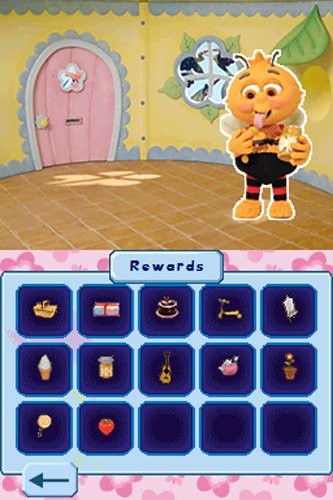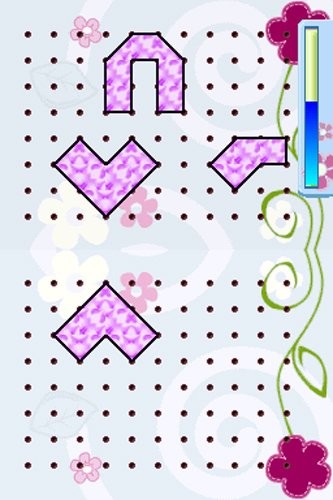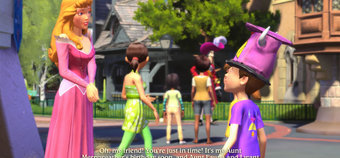Fifi's Garden Party for the DS is another entry in a long line of children's TV tie-in games, offering the fairly standard fare of a selection of mini-games set in the world of the program, only this time, there's something of a story to tie everything up. Being the absent minded muppet she is, Fifi the forget-me-not was so busy tending to her garden, that she's forgotten to prepare the party she was going to throw for her Flowertot friends. As such, it's up to you to help her traipse round the garden to find food and toys for the party - through the magical medium of a bunch of mini-games.

Every time you complete a mini-game, you get taken to the Rewards screen - where you can see which items you're missing.
If you're familiar with the TV show, you'll likely know that Fifi and her Flowertot friends are incredibly popular at the moment amongst children of a pre-school age. With that in mind, you could be forgiven for expecting the game to be designed accordingly. Unfortunately though, Fifi and the Flowertots seems to have set its sights a little bit too high, expecting a little bit too much from its younger audience. Unlike similar games for the younger age group, Fifi's Garden Party pretty heavy on the reading - from the intro that's told through a series of stills and text, to the main game, where Fifi's conversations with the other characters are told through text on the top screen - even the instructions before each mini-game require a pretty solid reading level. This wouldn't be too much of a problem, if the game were fully voiced, but instead, the game simply loops the theme tune in the background. In fact, I'd wager that the majority of Fifi And The Flowertots' audience are likely below school age, and as such are unlikely to be able to read the amount of text the game throws at them - leading to confusion when it comes to playing the minigames, and frustrated, manic tapping to skip past it all.
That said, for the kids who are getting there with their reading - perhaps those that are in their first few years at school - Fifi's Garden Party may well prove to be the perfect game to encourage their reading and maths. With fifteen mini-games, all with a mathematical, logical or puzzley bent - whether it's filling in the signs for a series of simple sums, arranging a load of dominoes or counting the number of honey pots shown on screen, there's a decent variety of games on offer here - so long as your child's old enough to be able to cope with the maths they throw at you. Mixing themselves in with the educationally themed fare are a variety of games that are just for fun, like 'Music', where you're tapping notes as they cross a blue line in a kind of Guitar-Hero-esque way, a whack-a-Grubby game called 'Hammer' where you need to tap them as they pop their heads out of pots, and the familiar game of pairs that seems to pop up in some form or another in every kids mini-game collection, as well as the given jigsaw puzzles and sliding tiles games.

Trying to spot that wormy thing on the bottom screen is a lot harder than it sounds (top centre, big blade of grass)... [I still can't see it - Ed]
Completing each of the fifteen mini-games to a certain standard earns you an item which Fifi can use for her party - items such as honey (to put in cakes), teapots and guitars and more, with the aim of the game being to collect them all, so Fifi's party can go off without a hitch. The rewards screen, shown after each mini-game you complete and manned by Bumble, shows you which items you've collected, and which ones you still need to get, so you know what to go onto next.
The only problem is, while there's a decent variety on offer here, much like the amount of reading required, some of the mini-games seem way too difficult for the audience that would be watching the TV show - and although you can pick an "easy" difficulty level, in our experience, it doesn't really make things easy enough. For example, the 'Abacus' game, which requires you to shift two columns of beads - representing the tens and units - up and down to make the number shown on the top screen may be roughly the right sort of difficulty for pre-school children, but this is probably the easiest Maths game on the collection. 'Calculations' is where things really start to get tricky. On the easiest difficulty, the questions you're asked here are still likely too hard for a pre-school audience - things like 15 - ? = 9, or 30 ? 9 = 21 are probably above and beyond what they've been taught - yet alone how hard it gets on medium, where questions like "171 divided by what gives 19" will challenge even the parents. True or False is similarly fairly simple on easy - but we don't think it's quite easy enough for the pre-school children who'll be playing it. While 2+3 = ? might have been OK, or something represented using beads, or seeds, or anything else children can count, the game instead asks if 14 - 9 = 5, or if 6 + 2 = 15. That's probably more borderline - but it still proved too hard for our test three year old.

'Drawing Shapes' also seems a bit of an odd one - copy the shapes from the top screen to the bottom, making sure you draw them in the correct places.
'Dominos' is another game that seems anomalously difficult, as somewhat embarrassingly, it took me three attempts on the medium difficulty to get any points at all, let alone enough to net the reward. All you have to do is match the dominos together, number to number - but the snaking grid you have to fit them in makes it a bit confusing for lining them up right, while 'Drawing Shapes', pictured on the left, seems another one that's probably more suited to Brain Training than Fifi.
In all, Fifi And The Flowertots: Fifi's Garden Party is a bit of a mixed bag - it's obviously had a lot of work put into it, but in terms of the children's audience it's going for, it seems to have far too high an expectation of what to expect from the kiddywinks that want to play it. While it's possible there are a few children who both still enjoy Fifi, and would be capable of doing the puzzles, while our test seven year old had no problem with the games, she assured she wasn't keen on Fifi because it was "for babies".
When you consider the large amount of reading a child has to do in order to understand the story (or even what they have to do in the minigames), combined with the difficulty of the games that are on offer, it seems that Fifi's Garden Party is simply going to be too hard for the pre-school children who want to play it. Instead, it's perhaps best suited to those who are in their first few years of school, and have progressed just beyond learning to read and doing basic maths - although by then, they may well consider themselves too old for Fifi, and what she has to offer.
Format Reviewed: Nintendo DS





















